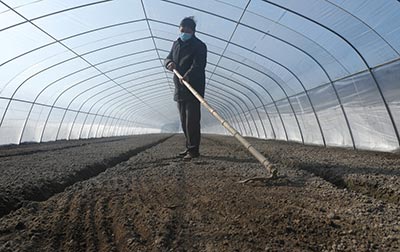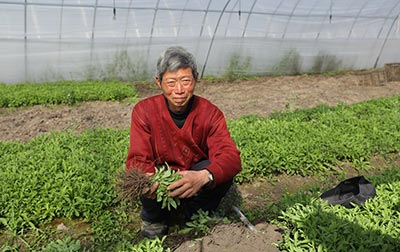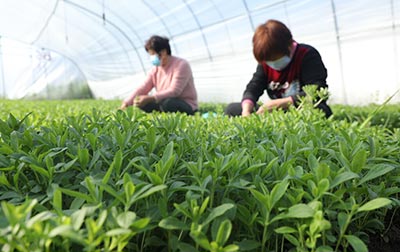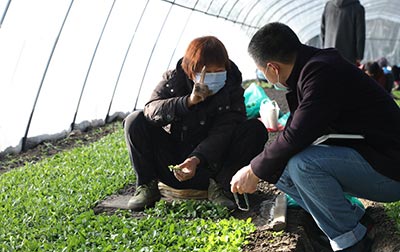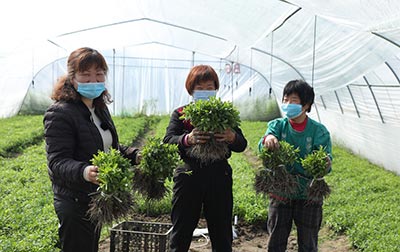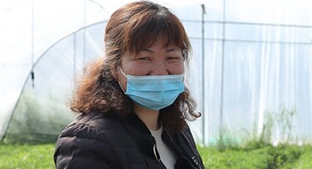As a leading stevia business and purpose-led organisation, we are committed to understanding and reducing the environmental impact of stevia supply chain.
Tate & Lyle, along with partners Earthwatch Europe (Earthwatch) and Nanjing Agricultural University (NJAU), continues to expand and evolve our sustainable stevia programme, the origins of which stretch back to 2019.
Building a sustainable stevia programme
In 2019, we partnered with environmental charity Earthwatch Europe (Earthwatch), working with Nanjing Agricultural University (NJAU) in East China, to assess the environmental impacts of our stevia supply chain in China, and to explore the environmental and socioeconomic sustainability of our stevia supply chain.
Data from 29 stevia farms in China was collected, with 73 variables assessed including soil quality, farming practices, yield and farmer profiles. As a comparatively young agricultural sector, Earthwatch found that the stevia growing community has a significant opportunity to strengthen its agronomic practices.
The life-cycle-analysis identified opportunities to decrease the environmental impact of our stevia suppliers. We have incorporated the recommendations into our sustainable stevia grower outreach programme.
In Spring 2021, Tate & Lyle established a sustainable stevia pilot programme in Dongtai in Jiangsu Province, based on the results of the earlier study. This pilot was developed with Earthwatch and rolled out with support from Nanjing Agricultural University (NJAU).
With this pilot, we aimed to demonstrate to farmers, and the wider industry, that growing stevia using more sustainable agricultural practices is not only good for the planet and the farmer, but also benefits consumers as an ingredient that can reduce sugar and calories in food and drink.
The pilot supported two farms to implement the most impactful recommendation from the 2019 study: to decrease the environmental impacts of stevia production by changing usage of synthetic fertiliser to more sustainable, slow-release alternatives, with support provided on type, application timing, targeting and volumes. The pilot also included hands on instruction on conducting soil samples and assessing their results. Understanding soil health is critical to making informed decisions on the farm to ensure a successful crop and minimal environmental impact.
In its first full year, the Dontai pilot programme saw promising reductions in environmental impacts while indicating direct economic benefits for farmers. Reductions were found in all of the nine1 environmental impact categories measured against the baseline, including:
- 16% reduction in eutrophication2 , a process in which a body of water becomes overly enriched with nutrients, therefore decreasing its quality.
- 13% reduction in acidification potential, the measure of the potential increase in acidity of an ecosystem, which is linked to reduced soil health, and water quality and lower crop yield.2
- 7% reduction in greenhouse gas emissions.2,3
The pilot found that slow-release fertilisers present farmers with the opportunity to reduce the number of applications and total volume of fertiliser used, while positively influencing stevia productivity and steviol glycoside content, resulting in a greater proportion of the desirable sweet components used to make stevia ingredients, providing an economic benefit to farmers.
Specifically, a reduction of 60–80% of fertiliser used and fertiliser optimisation, were found to provide environmental and productivity benefits.
These insights are in line with the wider research findings from the 2019 study.
1 Indicators measured include: climate change; acidification potential; eutrophication; abiotic depletion, minerals; abiotic depletion, fossil fuels; ozone layer depletion; photochemical oxidation potential; water use; primary energy demand.
2 Per pound of stevia rebaudioside A produced.
3 Emissions from direct fertiliser emissions and fertiliser production in Dongtai.
In response to the pilot results, in 2022, Tate & Lyle stevia suppliers in Dongtai committed to applying best practices around fertiliser use, along with several additional interventions recommended in the 2019 study. Participants will be supported to:
- Optimise fertiliser use including dosage, timing and volume
- Learn how to conduct regular, simple testing such as soil sampling and nutrient loss
- Collate and share data and lessons to build awareness as ambassadors in the farming community
- Pursue sustainability-related verification for their stevia through the Sustainable Agriculture Initiative Platform’s Farm Sustainability Assessment
- Reap the benefits of individualised action plans by signing up to Tate & Lyle’s voluntary stevia supplier sustainability commitment
Results of the 2022 programme will be verified by conducting on-site farm visits by experts at Nanjing Agricultural University, analysis of potential benefits to farmers and farm communities, and analysis of stevia plants, soil conditions and individual steviol glycosides.
In 2022, several farms in Gansu Province, West China will join industry peers in Dongtai in implementing relevant best practices identified by the programme to date to maximise environmental and economic benefits.
In addition, Tate & Lyle, in partnership with Earthwatch, will conduct a life-cycle-analysis in Gansu, West China to identify the most promising opportunities for reducing environmental impact and costs of stevia production, specific to that province, to inform further programme expansion.
Making progress
Now in its third full year, the programme continues to focus on optimising the use of fertiliser, due to its significant environmental impact, particularly on GHG emissions and watershed quality. The 2023 stevia growing season marked the first year in which all participating farmers used organic fertiliser in place of urea and, on average, this meant they used 74% less fertiliser overall. This had a very positive environmental impact, as can be seen from the figures below, with our 2023 updated lifecycle analysis showing significant reductions in GHG emissions, soil acidity and ecotoxicity. The programme, with its focus on regenerative agriculture farming practices, is helping to build a more resilient supply chain by mitigating the potential impacts of increasing seasonal variability in weather in China. It’s been really positive to see the cultural shift among the local farming community in recognising its benefits.
Participating farmers have been helped to achieve1:
• a 74% reduction in fertiliser use.
• a 90% decrease in terrestrial acidification, which shows significantly improved soil health and biodiversity, and improved availability of nutrients to the stevia plant.
• a 76% decrease in terrestrial ecotoxicity, which measures the impact that farming inputs, such as fertiliser, have on land-dependent organisms and their environment.
• a 56% reduction in greenhouse gas emissions.
1 Per pound of stevia rebaudioside A produced, compared to a 2019 baseline
In its second full year, the programme in Dongtai, which focused on soil sampling and soil health, saw more farmers taking part. The programme includes a voluntary agreement to sign up to Tate & Lyle’s Stevia Supplier Sustainability Commitment, a pledge to reduce the environmental impact of stevia farming. Growers are helped to understand better their environmental impact through sampling, assessments and participation in workshops, with a clear goal of reducing their environmental impact and improving productivity and profitability. The impact of the expanded programme has been very encouraging with double-digit reductions in every category measured in the life cycle analysis, most notably1:
• A 55% reduction in GHG emissions.
• A reduction in terrestrial and freshwater exotoxicity by 52% and 47%, respectively. Exotoxicity metrics measure the impact that farming inputs, such as fertiliser, have on land and freshwater dependent organisms and their environment.
• A 50% reduction in freshwater eutrophication, a process in which a body of water becomes overly enriched with nutrients, therefore decreasing local watershed quality and biodiversity.
1 Per pound of stevia rebaudioside A produced, compared to a 2019 baseline
The pilot focused on fertiliser optimisation, specifically replacing synthetic fertiliser with slow release alternatives with support provided to guide farmers on the type, application timing, targeting and volume of fertiliser used.
In its first full year, the Dontai pilot programme saw promising reductions in environmental impacts while indicating direct economic benefits for farmers. Reductions were found in all of the environmental impact categories measured against the baseline, the most significant including:
- 16% reduction in eutrophication1 , a process in which a body of water becomes overly enriched with nutrients, therefore decreasing local watershed quality.
- 13% reduction in acidification potential, the measure of the potential increase in acidity of an ecosystem, which is linked to reduced soil health, water quality, biodiversity and lower crop yield.1
- 7% reduction in greenhouse gas emissions.1,2
The pilot found that slow-release fertilisers present farmers with the opportunity to reduce the number of applications and total volume of fertiliser used by 60-80%, while positively influencing stevia productivity and steviol glycoside content, resulting in a greater proportion of the desirable sweet components used to make stevia ingredients, providing an economic benefit to farmers.
Sharing the results and lessons learned with local growers regardless of their participation in the programme increases awareness, provides opportunity to participate in the future and strengthens the local farming community.
1 Per pound of stevia rebaudioside A produced.
2 Emissions from farming in Dongtai.
Meet a stevia farmer
This is Aiping, one of the Dongtai farmers that we are helping to implement more sustainable practices on her family farm.
“I decided to get involved in Tate & Lyle’s programme to extend my view of farming, realising that sustainability is an important part of production. I hope to learn about new technologies and environmentally friendly practices. Less inputs and more outputs!
“I hope my farm will continue to develop and that other growers will see and learn from the positive changes we’re making.”
